The Cambridge History of China. Vol. 12: Republican China, 1912-1949, Part 1
Подождите немного. Документ загружается.

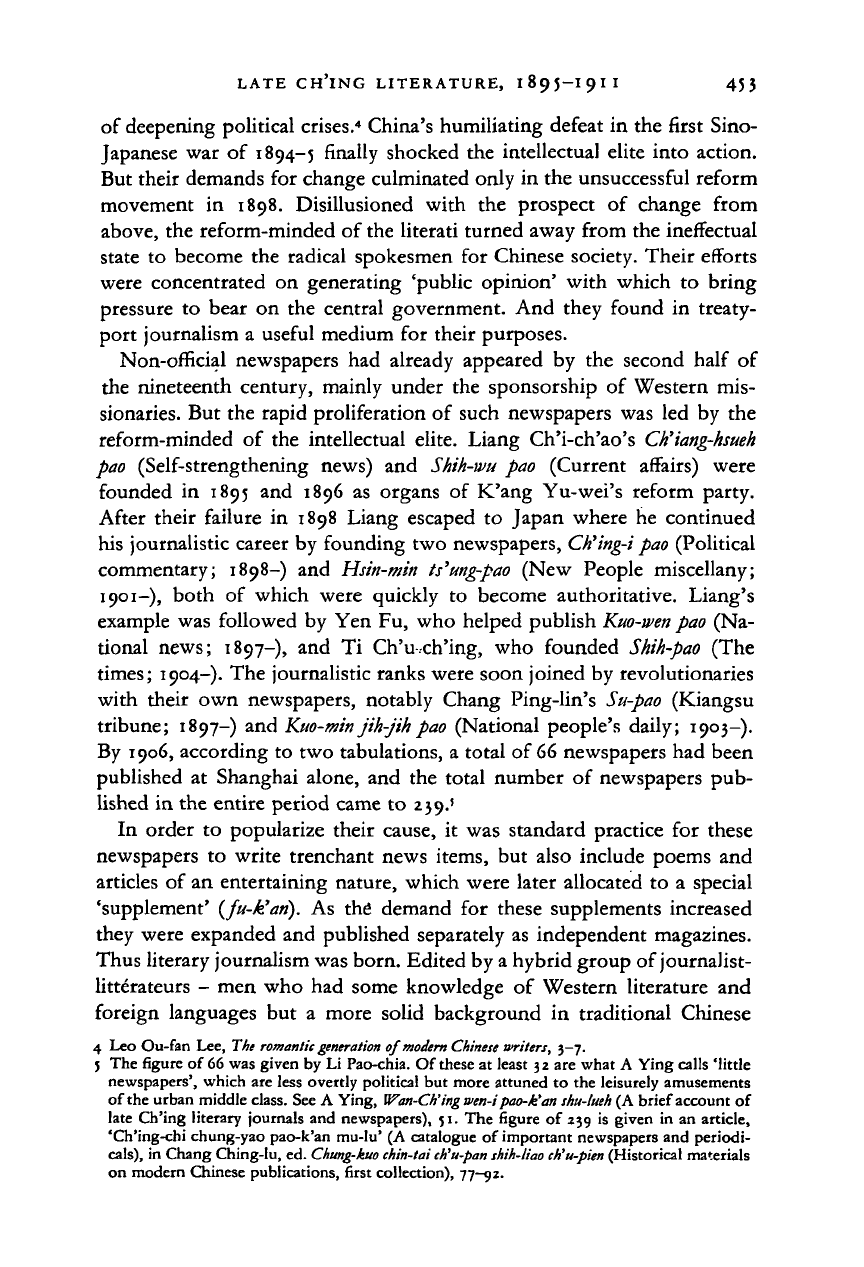
LATE CH'lNG LITERATURE, 1895-I9II 453
of deepening political crises.
4
China's humiliating defeat in the first Sino-
Japanese war of 1894-5 finally shocked the intellectual elite into action.
But their demands for change culminated only in the unsuccessful reform
movement in 1898. Disillusioned with the prospect of change from
above, the reform-minded of the literati turned away from the ineffectual
state to become the radical spokesmen for Chinese society. Their efforts
were concentrated on generating 'public opinion' with which to bring
pressure to bear on the central government. And they found in treaty-
port journalism a useful medium for their purposes.
Non-official newspapers had already appeared by the second half of
the nineteenth century, mainly under the sponsorship of Western mis-
sionaries. But the rapid proliferation of such newspapers was led by the
reform-minded of the intellectual elite. Liang Ch'i-ch'ao's
Ch'iang-hsueh
pao (Self-strengthening news) and
Shih-wu
pao (Current affairs) were
founded in 1895 and 1896 as organs of K'ang Yu-wei's reform party.
After their failure in 1898 Liang escaped to Japan where he continued
his journalistic career by founding two newspapers,
Ch'ing-i pao
(Political
commentary; 1898-) and Hsin-min
ts'ung-pao
(New People miscellany;
1901-),
both of which were quickly to become authoritative. Liang's
example was followed by Yen Fu, who helped publish
Kuo-wen pao
(Na-
tional news; 1897-), and Ti Ch'uch'ing, who founded
Shih-pao
(The
times;
1904-). The journalistic ranks were soon joined by revolutionaries
with their own newspapers, notably Chang Ping-lin's Su-pao (Kiangsu
tribune; 1897-) and Kuo-min jth-jih
pao
(National people's daily; 1903-).
By 1906, according to two tabulations, a total of
66
newspapers had been
published at Shanghai alone, and the total number of newspapers pub-
lished in the entire period came to 239.'
In order to popularize their cause, it was standard practice for these
newspapers to write trenchant news items, but also include poems and
articles of an entertaining nature, which were later allocated to a special
'supplement' (fu-k'ari). As the demand for these supplements increased
they were expanded and published separately as independent magazines.
Thus literary journalism was born. Edited by a hybrid group of journalist-
litterateurs - men who had some knowledge of Western literature and
foreign languages but a more solid background in traditional Chinese
4 Leo Ou-fan Lee, The
romantic generation
of
modern Chinese
writers, 3-7.
5 The figure of 66 was given by Li Pao-chia. Of these at least 32 are what A Ying calls 'little
newspapers', which are less overtly political but more attuned to the leisurely amusements
of the urban middle class. See A Ying,
Wan-Ch'ing
wen-i pao-k'an
shu-lueh
(A brief account of
late Ch'ing literary journals and newspapers), 51. The figure of 239 is given in an article,
'Ch'ing-chi chung-yao pao-k'an mu-lu' (A catalogue of important newspapers and periodi-
cals),
in Chang Ching-Iu, ed.
Chung-kuo chin-tai ch'u-pan shih-liao ch'u-pien
(Historical materials
on modern Chinese publications, first collection), 77—92.
Cambridge Histories Online © Cambridge University Press, 2008
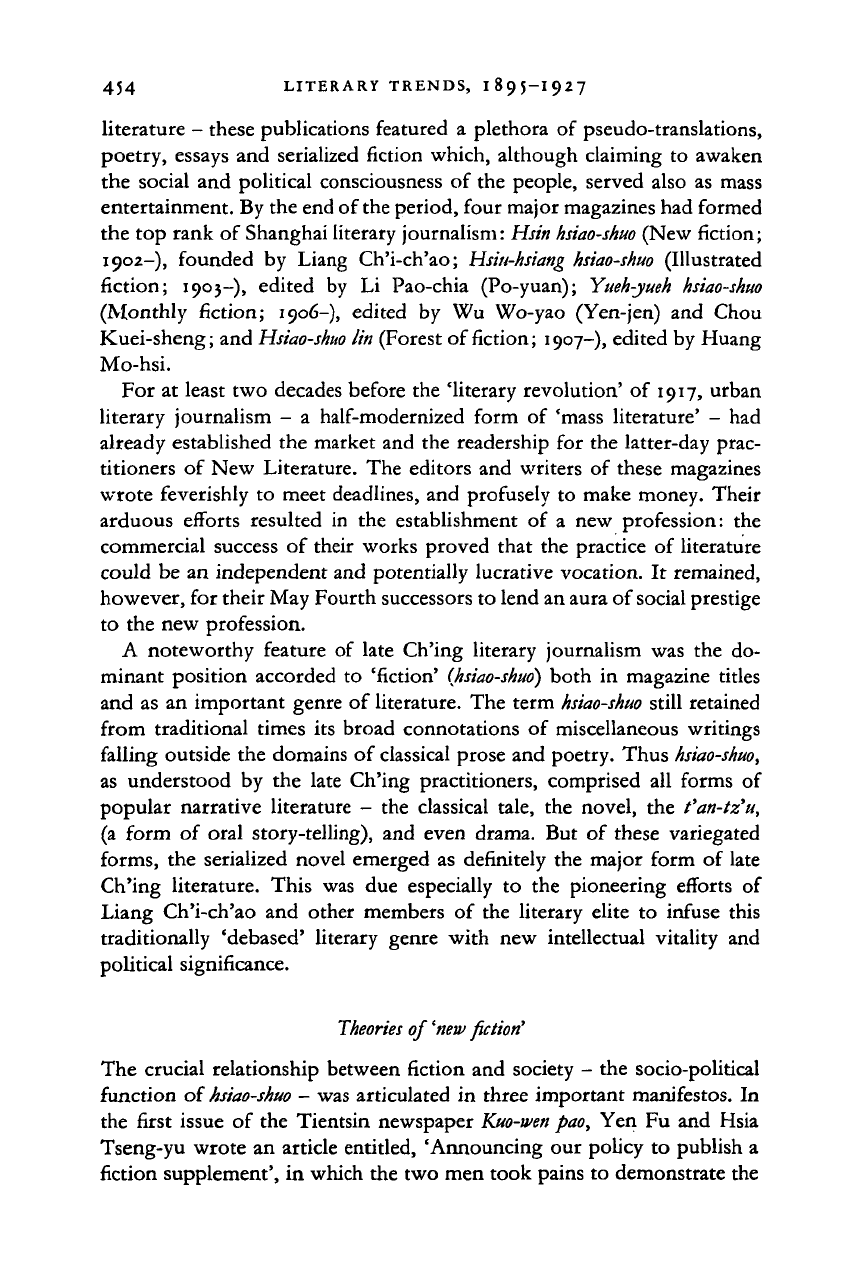
454 LITERARY TRENDS, 1895-I927
literature - these publications featured a plethora of pseudo-translations,
poetry, essays and serialized fiction which, although claiming to awaken
the social and political consciousness of the people, served also as mass
entertainment. By the end of
the
period, four major magazines had formed
the top rank of Shanghai literary journalism: Hsin
hsiao-shuo
(New fiction;
1902-),
founded by Liang Ch'i-ch'ao;
Hsin-hsiang hsiao-shuo
(Illustrated
fiction;
1903-),
edited by Li Pao-chia (Po-yuan); Yueh-jueh
hsiao-shuo
(Monthly fiction; 1906-), edited by Wu Wo-yao (Yen-jen) and Chou
Kuei-sheng; and
Hsiao-shuo
lin (Forest of fiction; 1907-), edited by Huang
Mo-hsi.
For at least two decades before the 'literary revolution' of 1917, urban
literary journalism - a half-modernized form of 'mass literature' - had
already established the market and the readership for the latter-day prac-
titioners of New Literature. The editors and writers of these magazines
wrote feverishly to meet deadlines, and profusely to make money. Their
arduous efforts resulted in the establishment of a new profession: the
commercial success of their works proved that the practice of literature
could be an independent and potentially lucrative vocation. It remained,
however, for their May Fourth successors to lend an aura of social prestige
to the new profession.
A noteworthy feature of late Ch'ing literary journalism was the do-
minant position accorded to 'fiction'
(hsiao-shuo')
both in magazine titles
and as an important genre of literature. The term
hsiao-shuo
still retained
from traditional times its broad connotations of miscellaneous writings
falling outside the domains of classical prose and poetry. Thus
hsiao-shuo,
as understood by the late Ch'ing practitioners, comprised all forms of
popular narrative literature - the classical tale, the novel, the t'an-tz'u,
(a form of oral story-telling), and even drama. But of these variegated
forms,
the serialized novel emerged as definitely the major form of late
Ch'ing literature. This was due especially to the pioneering efforts of
Liang Ch'i-ch'ao and other members of the literary elite to infuse this
traditionally 'debased' literary genre with new intellectual vitality and
political significance.
Theories of 'new fiction'
The crucial relationship between fiction and society - the socio-political
function of
hsiao-shuo —
was articulated in three important manifestos. In
the first issue of the Tientsin newspaper
Kuo-wen
pao,
Yen Fu and Hsia
Tseng-yu wrote an article entitled, 'Announcing our policy to publish a
fiction supplement', in which the two men took pains to demonstrate the
Cambridge Histories Online © Cambridge University Press, 2008
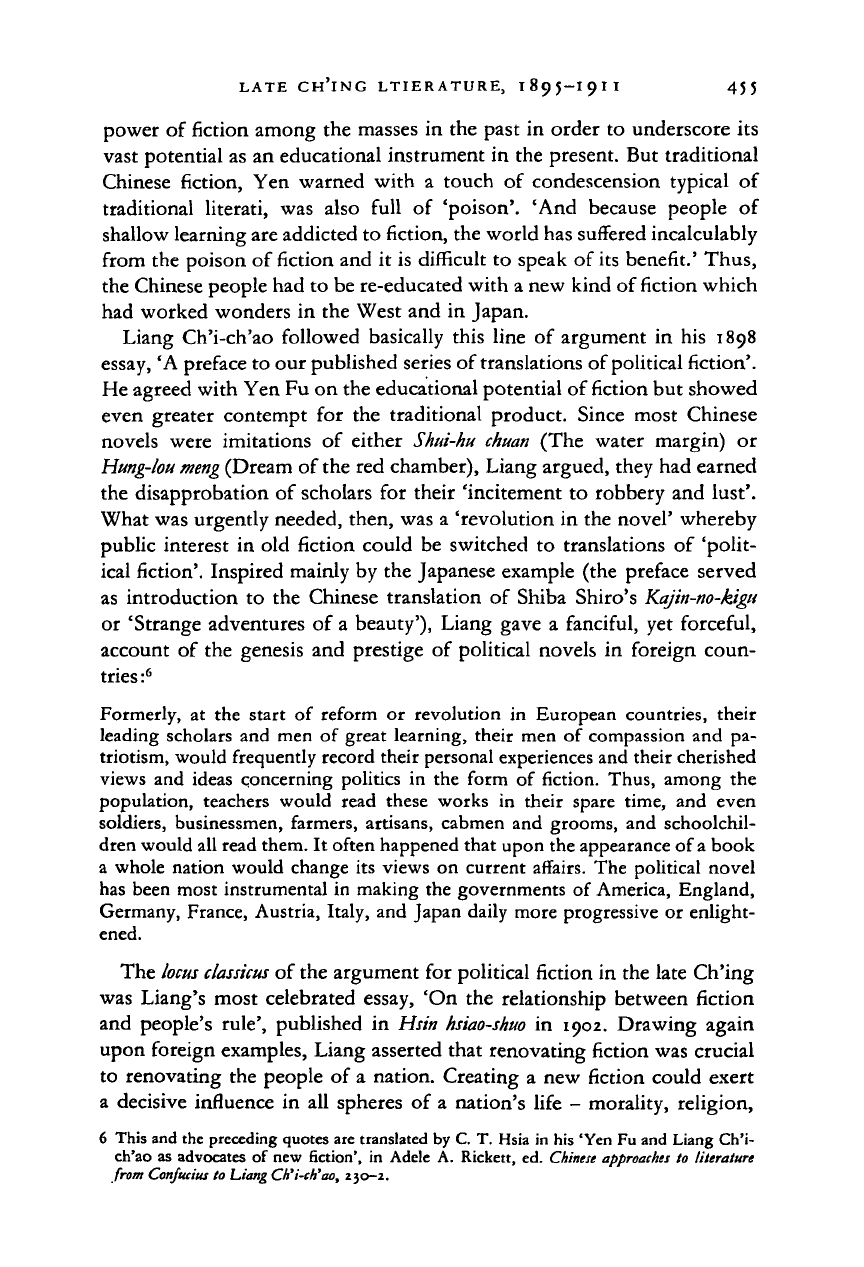
LATE CH'lNG LTIERATURE, 1895-I9II 455
power of fiction among the masses in the past in order to underscore its
vast potential as an educational instrument in the present. But traditional
Chinese fiction, Yen warned with a touch of condescension typical of
traditional literati, was also full of 'poison'. 'And because people of
shallow learning are addicted to fiction, the world has suffered incalculably
from the poison of fiction and it is difficult to speak of its benefit.' Thus,
the Chinese people had to be re-educated with a new kind of fiction which
had worked wonders in the West and in Japan.
Liang Ch'i-ch'ao followed basically this line of argument in his 1898
essay, 'A preface to our published series of translations of political fiction'.
He agreed with Yen Fu on the educational potential of fiction but showed
even greater contempt for the traditional product. Since most Chinese
novels were imitations of either Shui-hu
chuan
(The water margin) or
Hung-lou meng
(Dream of the red chamber), Liang argued, they had earned
the disapprobation of scholars for their 'incitement to robbery and lust'.
What was urgently needed, then, was a 'revolution in the novel' whereby
public interest in old fiction could be switched to translations of 'polit-
ical fiction'. Inspired mainly by the Japanese example (the preface served
as introduction to the Chinese translation of Shiba Shiro's
Kajin-no-kigu
or 'Strange adventures of a beauty'), Liang gave a fanciful, yet forceful,
account of the genesis and prestige of political novels in foreign coun-
tries :
6
Formerly, at the start of reform or revolution in European countries, their
leading scholars and men of great learning, their men of compassion and pa-
triotism, would frequently record their personal experiences and their cherished
views and ideas concerning politics in the form of fiction. Thus, among the
population, teachers would read these works in their spare time, and even
soldiers, businessmen, farmers, artisans, cabmen and grooms, and schoolchil-
dren would all read them. It often happened that upon the appearance of
a
book
a whole nation would change its views on current affairs. The political novel
has been most instrumental in making the governments of America, England,
Germany, France, Austria, Italy, and Japan daily more progressive or enlight-
ened.
The
locus classicus
of the argument for political fiction in the late Ch'ing
was Liang's most celebrated essay, 'On the relationship between fiction
and people's rule', published in Hsin
hsiao-shuo
in 1902. Drawing again
upon foreign examples, Liang asserted that renovating fiction was crucial
to renovating the people of a nation. Creating a new fiction could exert
a decisive influence in all spheres of a nation's life - morality, religion,
6 This and the preceding quotes are translated by C. T. Hsia in his 'Yen Fu and Liang Ch'i-
ch'ao as advocates of new fiction', in Adele A. Rickett, ed.
Chinese approaches
to literature
from Confucius to Liang Ch'i-ch'ao, 230-2.
Cambridge Histories Online © Cambridge University Press, 2008
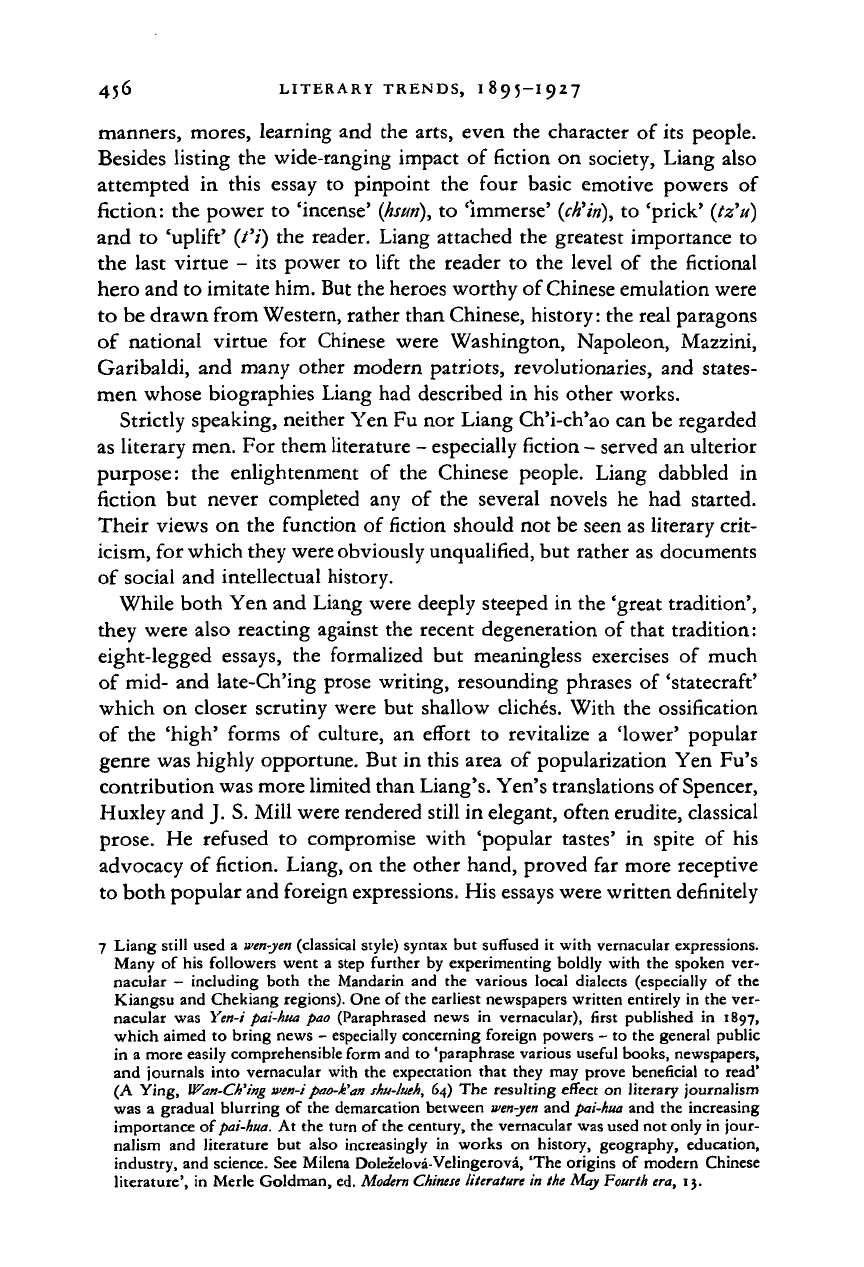
456 LITERARY TRENDS, 1895-I927
manners, mores, learning and the arts, even the character
of
its people.
Besides listing
the
wide-ranging impact
of
fiction
on
society, Liang also
attempted
in
this essay
to
pinpoint
the
four basic emotive powers
of
fiction: the power
to
'incense'
(hsun),
to
'immerse'
(ch'i/i),
to
'prick' {tz"u)
and
to
'uplift'
(/';')
the
reader. Liang attached the greatest importance
to
the last virtue
- its
power
to
lift
the
reader
to the
level
of the
fictional
hero and to imitate him. But the heroes worthy of Chinese emulation were
to be drawn from Western, rather than Chinese, history: the real paragons
of national virtue
for
Chinese were Washington, Napoleon, Mazzini,
Garibaldi,
and
many other modern patriots, revolutionaries,
and
states-
men whose biographies Liang had described
in
his other works.
Strictly speaking, neither Yen Fu nor Liang Ch'i-ch'ao can be regarded
as literary men. For them literature
-
especially fiction
-
served an ulterior
purpose:
the
enlightenment
of the
Chinese people. Liang dabbled
in
fiction but never completed
any of the
several novels
he had
started.
Their views
on
the function
of
fiction should not be seen as literary crit-
icism, for which they were obviously unqualified, but rather as documents
of social and intellectual history.
While both Yen and Liang were deeply steeped
in
the 'great tradition',
they were also reacting against the recent degeneration
of
that tradition:
eight-legged essays,
the
formalized
but
meaningless exercises
of
much
of mid- and late-Ch'ing prose writing, resounding phrases
of
'statecraft'
which
on
closer scrutiny were
but
shallow cliches. With
the
ossification
of
the
'high' forms
of
culture,
an
effort
to
revitalize
a
'lower' popular
genre was highly opportune. But in this area
of
popularization Yen
Fu's
contribution was more limited than Liang's. Yen's translations of Spencer,
Huxley and
J.
S. Mill were rendered still in elegant, often erudite, classical
prose.
He
refused
to
compromise with 'popular tastes'
in
spite
of his
advocacy
of
fiction. Liang,
on
the other hand, proved
far
more receptive
to both popular and foreign expressions. His essays were written definitely
7 Liang still used
a
wen-yen
(classical style) syntax but suffused
it
with vernacular expressions.
Many
of
his followers went
a
step further by experimenting boldly with
the
spoken ver-
nacular
-
including both
the
Mandarin
and the
various local dialects (especially
of the
Kiangsu and Chekiang regions). One
of
the earliest newspapers written entirely
in
the ver-
nacular
was
Ye/t-i pai-hua
pao (Paraphrased news
in
vernacular), first published
in
1897,
which aimed
to
bring news
-
especially concerning foreign powers
-
to the general public
in
a
more easily comprehensible form and to 'paraphrase various useful books, newspapers,
and journals into vernacular with
the
expectation that they may prove beneficial
to
read'
(A Ying,
Wan-Ch'ing wen-i pao-i'an
shu-lueh,
64) The resulting effect on literary journalism
was
a
gradual blurring
of
the demarcation between
wen-yen
and
pai-hua
and the increasing
importance of
pai-hua.
At the turn
of
the century, the vernacular was used not only in jour-
nalism
and
literature
but
also increasingly
in
works
on
history, geography, education,
industry, and science. See Milena Dolezelova-Velingerova, 'The origins
of
modern Chinese
literature',
in
Merle Goldman, ed.
Modern Chinese
literature in the May Fourth era,
13.
Cambridge Histories Online © Cambridge University Press, 2008
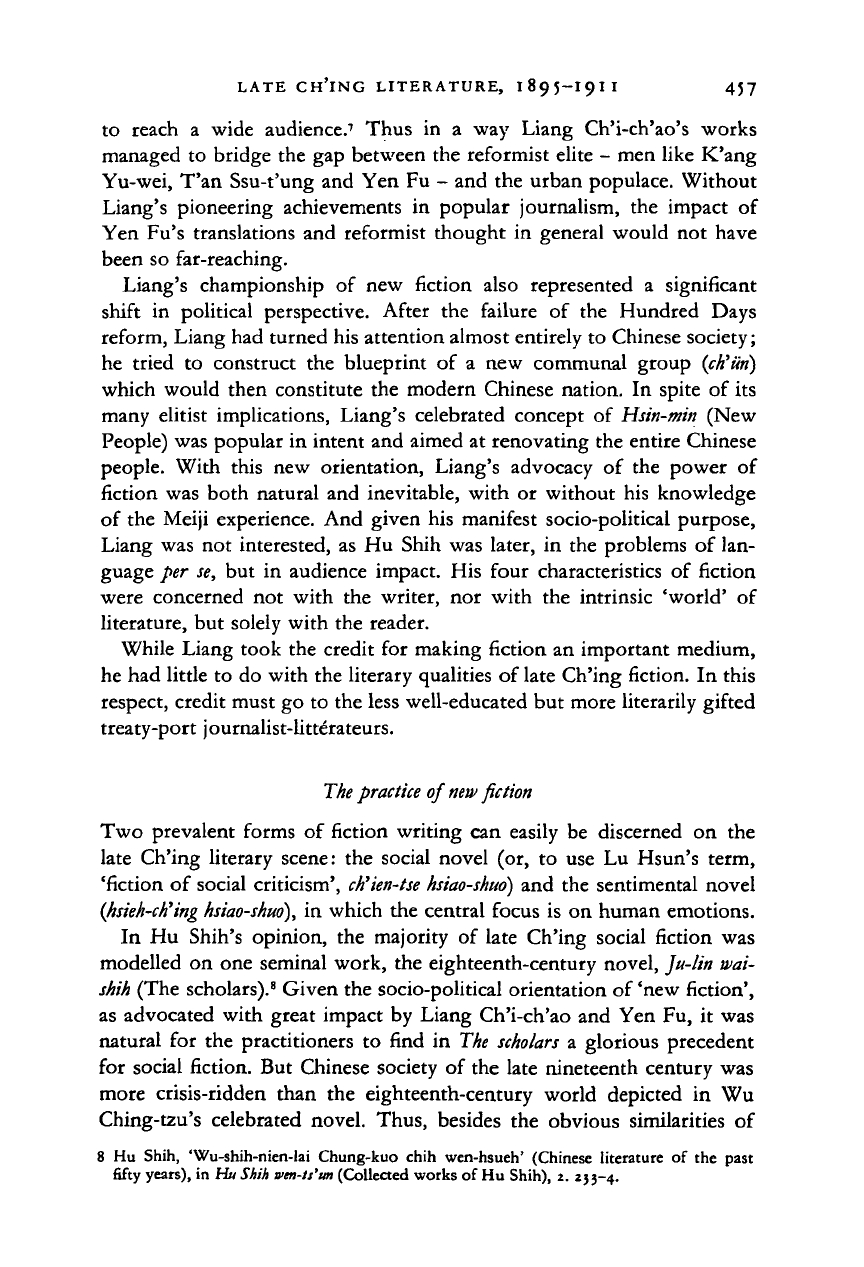
LATE CH'lNG LITERATURE, 1895-I9II 457
to reach a wide audience.
7
Thus in a way Liang Ch'i-ch'ao's works
managed to bridge the gap between the reformist elite - men like K'ang
Yu-wei, T'an Ssu-t'ung and Yen Fu - and the urban populace. Without
Liang's pioneering achievements in popular journalism, the impact of
Yen Fu's translations and reformist thought in general would not have
been so far-reaching.
Liang's championship of new fiction also represented a significant
shift in political perspective. After the failure of the Hundred Days
reform, Liang had turned his attention almost entirely to Chinese society;
he tried to construct the blueprint of a new communal group
(ch'iiri)
which would then constitute the modern Chinese nation. In spite of its
many elitist implications, Liang's celebrated concept of
Hsin-min
(New
People) was popular in intent and aimed at renovating the entire Chinese
people. With this new orientation, Liang's advocacy of the power of
fiction was both natural and inevitable, with or without his knowledge
of the Meiji experience. And given his manifest socio-political purpose,
Liang was not interested, as Hu Shih was later, in the problems of lan-
guage per
se,
but in audience impact. His four characteristics of fiction
were concerned not with the writer, nor with the intrinsic 'world' of
literature, but solely with the reader.
While Liang took the credit for making fiction an important medium,
he had little to do with the literary qualities of late Ch'ing fiction. In this
respect, credit must go to the less well-educated but more literarily gifted
treaty-port journalist-litterateurs.
The practice of new fiction
Two prevalent forms of fiction writing can easily be discerned on the
late Ch'ing literary scene: the social novel (or, to use Lu Hsun's term,
'fiction of social criticism',
ch'ien-tse hsiao-shuo)
and the sentimental novel
(hsieh-ch'ing
hsiao-shuo),
in which the central focus is on human emotions.
In Hu Shih's opinion, the majority of late Ch'ing social fiction was
modelled on one seminal work, the eighteenth-century novel, Ju-lin wai-
shih
(The scholars).
8
Given the socio-political orientation of 'new fiction',
as advocated with great impact by Liang Ch'i-ch'ao and Yen Fu, it was
natural for the practitioners to find in The
scholars
a glorious precedent
for social fiction. But Chinese society of the late nineteenth century was
more crisis-ridden than the eighteenth-century world depicted in Wu
Ching-t2u's celebrated novel. Thus, besides the obvious similarities of
8 Hu Shih, 'Wu-shih-nien-lai Chung-kuo chih wen-hsueh' (Chinese literature of the past
fifty
years),
in H»
Shih B>en-ti'im
(Collected works of Hu Shin), 2. 233-4.
Cambridge Histories Online © Cambridge University Press, 2008
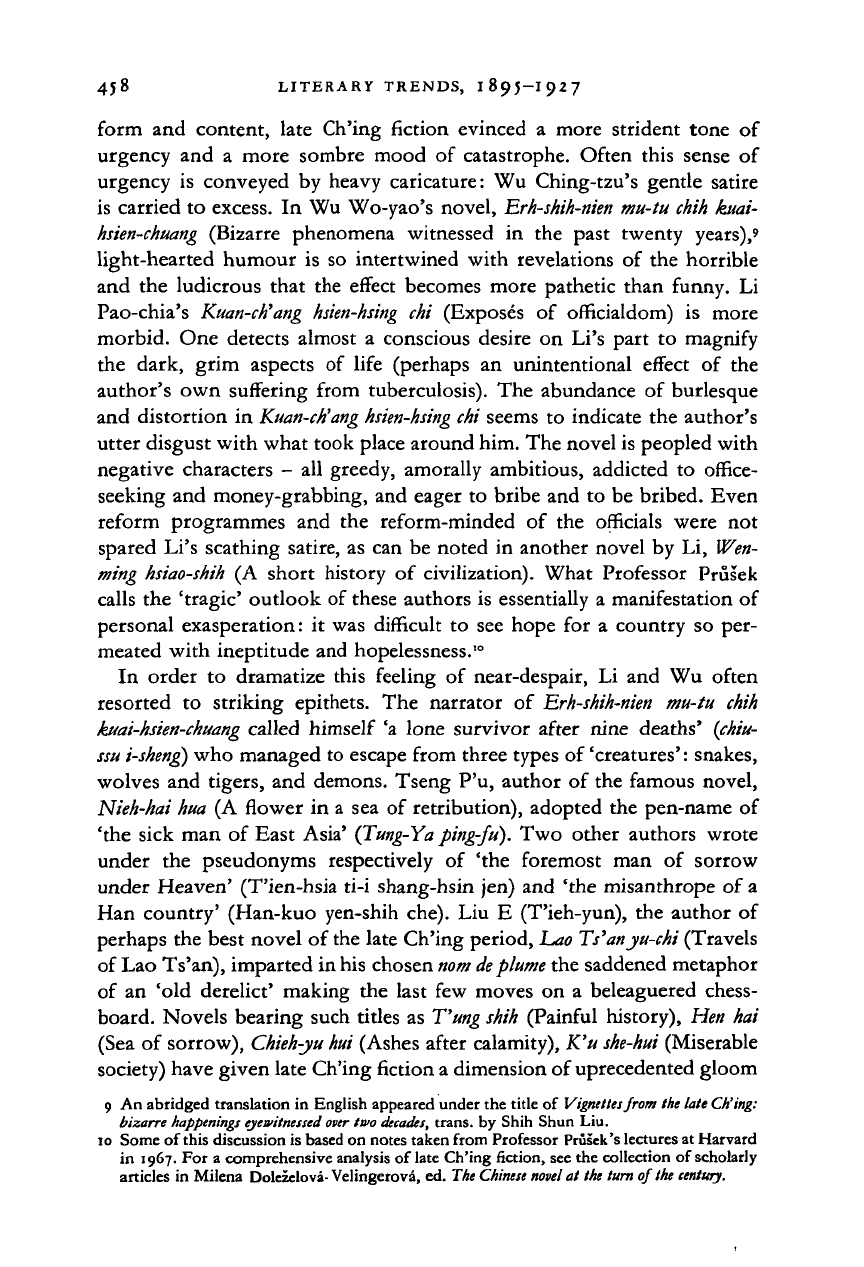
458 LITERARY TRENDS, 1895-I927
form and content, late Ch'ing fiction evinced
a
more strident tone
of
urgency and
a
more sombre mood
of
catastrophe. Often this sense
of
urgency
is
conveyed by heavy caricature: Wu Ching-tzu's gentle satire
is carried to excess.
In
Wu Wo-yao's novel,
Erh-shih-nien
mu-tu
chih
kuai-
hsien-chuang
(Bizarre phenomena witnessed
in the
past twenty years),'
light-hearted humour
is
so intertwined with revelations
of
the horrible
and the ludicrous that the effect becomes more pathetic than funny.
Li
Pao-chia's
Kuan-ch'ang hsien-hsing
chi (Exposes
of
officialdom)
is
more
morbid. One detects almost
a
conscious desire on Li's part
to
magnify
the dark, grim aspects
of
life (perhaps
an
unintentional effect
of
the
author's own suffering from tuberculosis). The abundance
of
burlesque
and distortion in
Kuan-ch'ang hsien-hsing chi
seems to indicate the author's
utter disgust with what took place around him. The novel is peopled with
negative characters
-
all greedy, amorally ambitious, addicted
to
office-
seeking and money-grabbing, and eager to bribe and to be bribed. Even
reform programmes and
the
reform-minded
of
the officials were
not
spared Li's scathing satire, as can be noted in another novel by Li, Wen-
ming
hsiao-shih
(A
short history
of
civilization). What Professor Prusek
calls the 'tragic' outlook of these authors is essentially a manifestation of
personal exasperation:
it
was difficult
to
see hope for
a
country so per-
meated with ineptitude and hopelessness.
10
In order
to
dramatize this feeling
of
near-despair,
Li
and Wu often
resorted
to
striking epithets. The narrator
of
Erh-shih-nien
mu-tu chih
kuai-hsien-chuang
called himself
'a
lone survivor after nine deaths' (chiu-
ssu
i-sheng)
who managed to escape from three types of 'creatures': snakes,
wolves and tigers, and demons. Tseng P'u, author of the famous novel,
Nieh-hai
hua
(A flower in a sea
of
retribution), adopted the pen-name of
'the sick man
of
East Asia'
(Tung-Ya
ping-fu).
Two other authors wrote
under
the
pseudonyms respectively
of
'the foremost man
of
sorrow
under Heaven' (T'ien-hsia ti-i shang-hsin jen) and 'the misanthrope of a
Han country' (Han-kuo yen-shih che). Liu
E
(T'ieh-yun), the author of
perhaps the best novel of the late Ch'ing period, Lao Ts'anyu-chi (Travels
of Lao Ts'an), imparted in his chosen
nom
de
plume
the saddened metaphor
of an 'old derelict' making the last few moves on
a
beleaguered chess-
board. Novels bearing such titles as
T'ung
shih
(Painful history), Hen hat
(Sea of sorrow),
Chieh-ju hui
(Ashes after calamity), K'u
she-hui
(Miserable
society) have given late Ch'ing fiction a dimension of uprecedented gloom
9 An abridged translation in English appeared under the title
of
Vignettes from the late
Ch'ing:
bizarre
happening!
eyetvitnessed over
two
decades,
trans, by Shih Shun Liu.
io Some of this discussion is based on notes taken from Professor Prusek's lectures at Harvard
in 1967. For a comprehensive analysis of late Ch'ing fiction, see the collection of scholarly
articles in Milena Dolezelova- Velingerova, ed.
The Chinese novel
at the turn of
the
century.
Cambridge Histories Online © Cambridge University Press, 2008
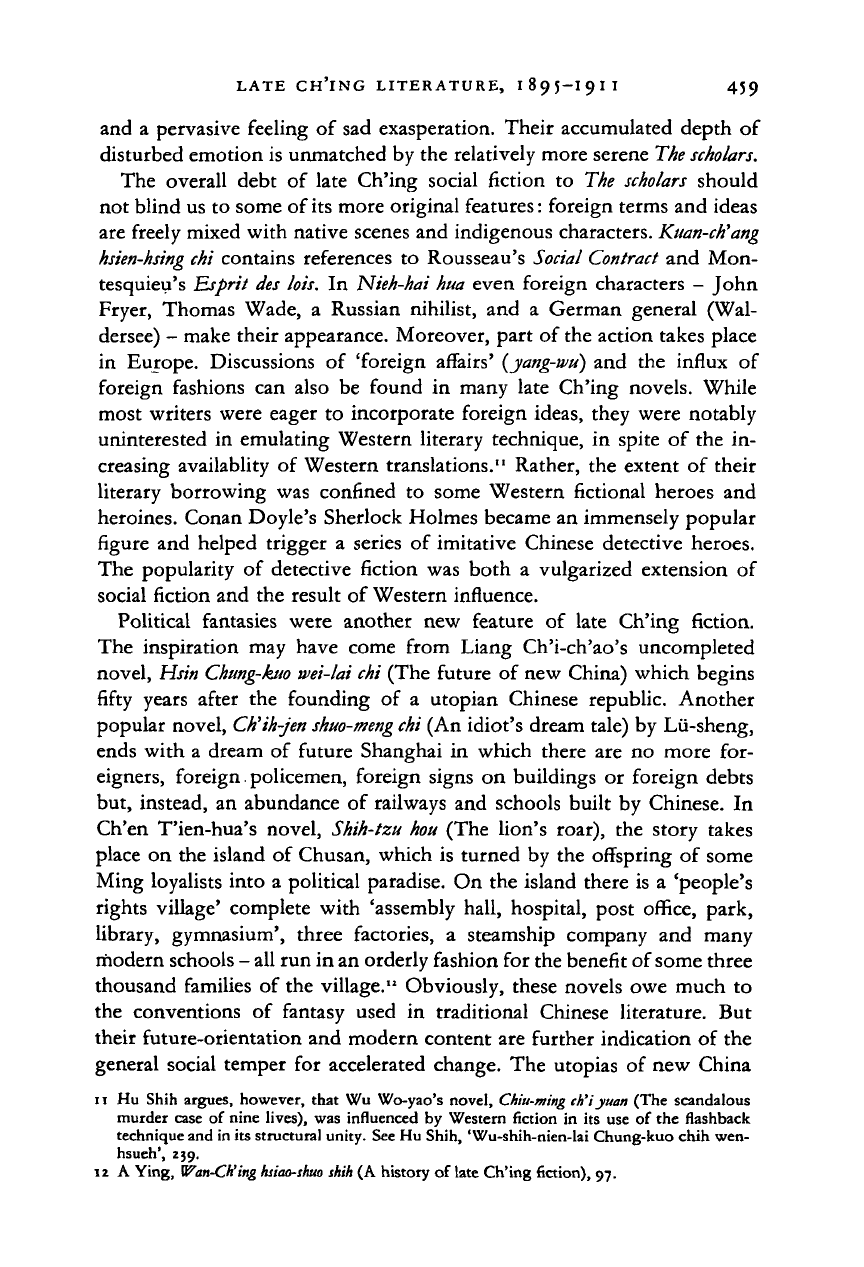
LATE CH'lNG LITERATURE, 1895-I9II 459
and a pervasive feeling of sad exasperation. Their accumulated depth of
disturbed emotion is unmatched by the relatively more serene
The
scholars.
The overall debt of late Ch'ing social fiction to The
scholars
should
not blind us to some of
its
more original features: foreign terms and ideas
are freely mixed with native scenes and indigenous characters.
Kuan-ch'ang
hsien-hsing chi
contains references to Rousseau's
Social Contract
and Mon-
tesquieu's Tisprit
des
lots.
In Nieh-hai
hua
even foreign characters - John
Fryer, Thomas Wade, a Russian nihilist, and a German general (Wal-
dersee) - make their appearance. Moreover, part of the action takes place
in Europe. Discussions of 'foreign affairs'
(yang-ivu)
and the influx of
foreign fashions can also be found in many late Ch'ing novels. While
most writers were eager to incorporate foreign ideas, they were notably
uninterested in emulating Western literary technique, in spite of the in-
creasing availablity of Western translations." Rather, the extent of their
literary borrowing was confined to some Western fictional heroes and
heroines. Conan Doyle's Sherlock Holmes became an immensely popular
figure and helped trigger a series of imitative Chinese detective heroes.
The popularity of detective fiction was both a vulgarized extension of
social fiction and the result of Western influence.
Political fantasies were another new feature of late Ch'ing fiction.
The inspiration may have come from Liang Ch'i-ch'ao's uncompleted
novel, Hsin
Chung-kuo wei-lai chi
(The future of new China) which begins
fifty years after the founding of a Utopian Chinese republic. Another
popular novel,
Ch'ih-jen shuo-meng chi
(An idiot's dream tale) by Lii-sheng,
ends with a dream of future Shanghai in which there are no more for-
eigners, foreign. policemen, foreign signs on buildings or foreign debts
but, instead, an abundance of railways and schools built by Chinese. In
Ch'en T'ien-hua's novel, Shih-tzu
hou
(The lion's roar), the story takes
place on the island of Chusan, which is turned by the offspring of some
Ming loyalists into a political paradise. On the island there is a 'people's
rights village' complete with 'assembly hall, hospital, post office, park,
library, gymnasium', three factories, a steamship company and many
modern schools - all run in an orderly fashion for the benefit of some three
thousand families of the village." Obviously, these novels owe much to
the conventions of fantasy used in traditional Chinese literature. But
their future-orientation and modern content are further indication of the
general social temper for accelerated change. The Utopias of new China
11 Hu Shih argues, however, that Wu Wo-yao's novel,
Chiu-ming
cfi'iyuan (The scandalous
muider case of nine lives), was influenced by Western fiction in its use of the flashback
technique and in its structural unity. See Hu Shih, 'Wu-shih-nien-lai Chung-kuo chih wen-
hsueh', 259.
12 A Ying, Wan-Citing
hsiao-shuo shih
(A history of late Ch'ing fiction), 97.
Cambridge Histories Online © Cambridge University Press, 2008
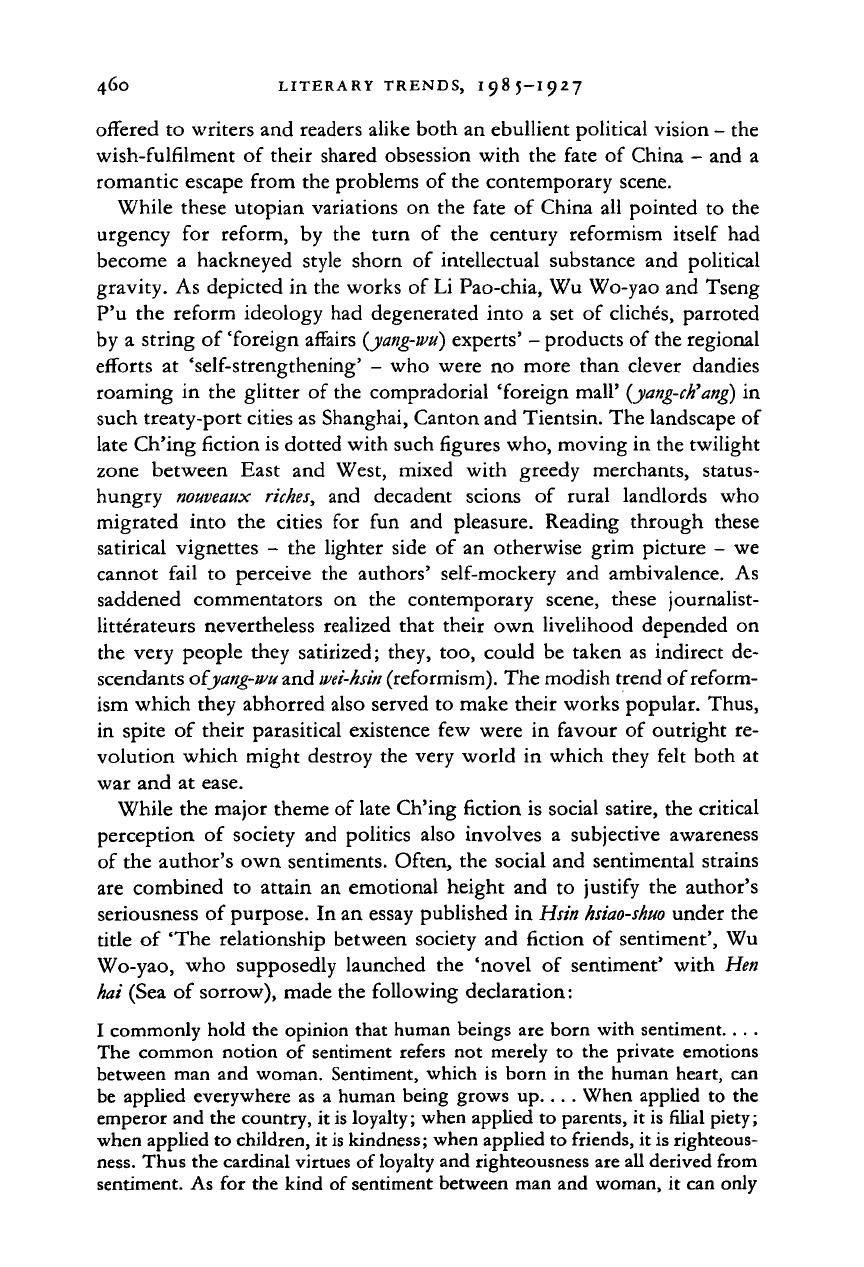
460 LITERARY TRENDS, I985-I927
offered to writers and readers alike both an ebullient political vision
-
the
wish-fulfilment
of
their shared obsession with the fate of China
-
and
a
romantic escape from the problems of the contemporary scene.
While these Utopian variations on the fate
of
China all pointed to the
urgency
for
reform,
by
the turn
of
the century reformism itself had
become
a
hackneyed style shorn
of
intellectual substance and political
gravity. As depicted in the works of Li Pao-chia, Wu Wo-yao and Tseng
P'u the reform ideology had degenerated into
a
set
of
cliches, parroted
by
a
string of 'foreign affairs
(yang-wu)
experts'
-
products of the regional
efforts
at
'self-strengthening'
-
who were
no
more than clever dandies
roaming
in
the glitter of the compradorial 'foreign mall'
(yang-ch'ang)
in
such treaty-port cities as Shanghai, Canton and Tientsin. The landscape of
late Ch'ing fiction is dotted with such figures who, moving in the twilight
2one between East and West, mixed with greedy merchants, status-
hungry nouveaux riches,
and
decadent scions
of
rural landlords
who
migrated into
the
cities
for fun
and pleasure. Reading through these
satirical vignettes
-
the lighter side
of
an otherwise grim picture
-
we
cannot fail
to
perceive the authors' self-mockery and ambivalence.
As
saddened commentators
on the
contemporary scene, these journalist-
litterateurs nevertheless realized that their own livelihood depended on
the very people they satirized; they, too, could be taken as indirect de-
scendants
oiyang-wu
and
wd-hsin
(reformism). The modish trend of reform-
ism which they abhorred also served to make their works popular. Thus,
in spite
of
their parasitical existence few were
in
favour
of
outright re-
volution which might destroy the very world
in
which they felt both at
war and at ease.
While the major theme of late Ch'ing fiction is social satire, the critical
perception
of
society and politics also involves
a
subjective awareness
of the author's own sentiments. Often, the social and sentimental strains
are combined
to
attain an emotional height and
to
justify the author's
seriousness of purpose. In an essay published in Hsin
hsiao-shuo
under the
title
of
'The relationship between society and fiction
of
sentiment', Wu
Wo-yao, who supposedly launched the 'novel
of
sentiment* with Hen
hai (Sea of sorrow), made the following declaration:
I commonly hold the opinion that human beings are born with sentiment. . .
.
The common notion
of
sentiment refers not merely to the private emotions
between man and woman. Sentiment, which is born in the human heart, can
be applied everywhere as a human being grows up. . . . When applied to the
emperor and the country, it
is
loyalty; when applied to parents, it is filial piety;
when applied to children, it
is
kindness; when applied to friends, it
is
righteous-
ness.
Thus the cardinal virtues of loyalty and righteousness are all derived from
sentiment. As for the kind of sentiment between man and woman, it can only
Cambridge Histories Online © Cambridge University Press, 2008
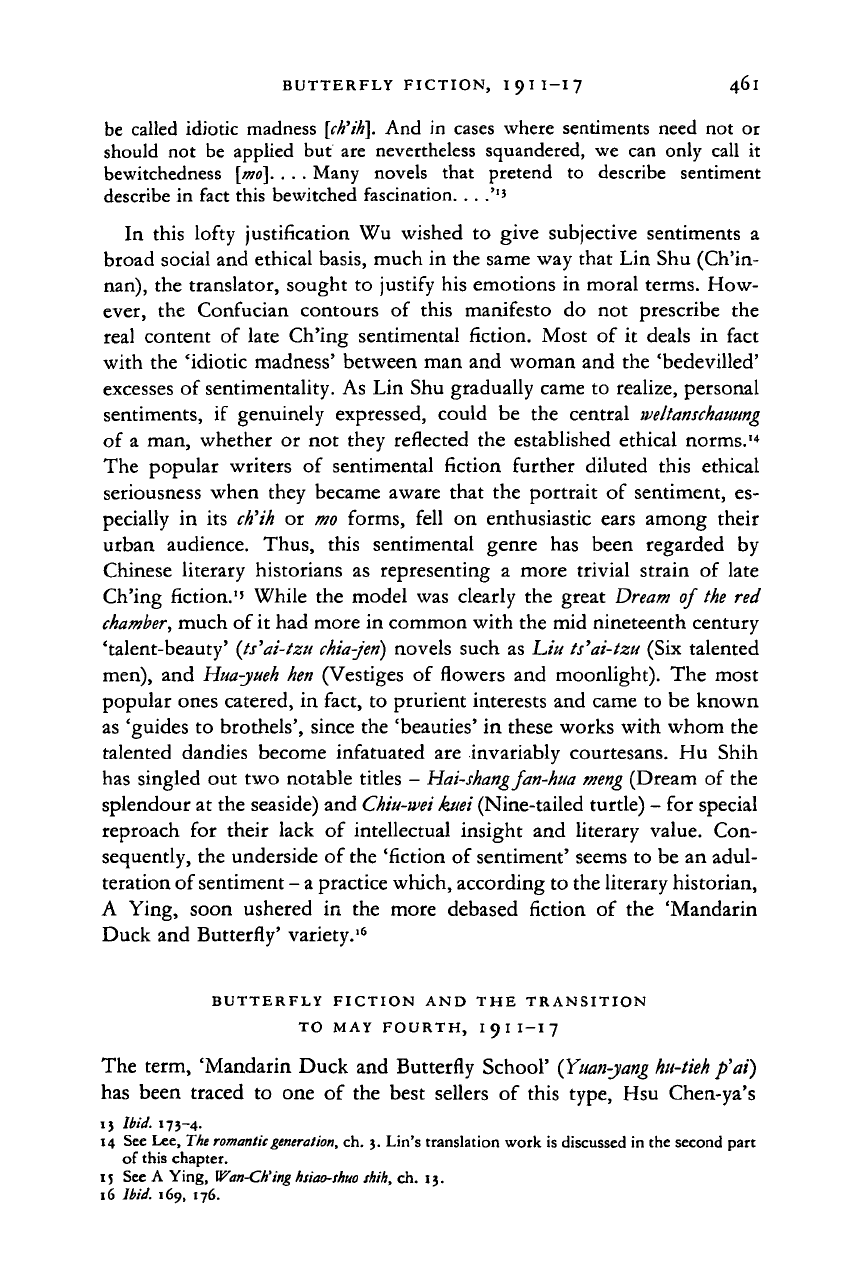
BUTTERFLY FICTION, I9II-17
461
be called idiotic madness
[ch'ih].
And
in
cases where sentiments need
not
or
should
not be
applied
but
are
nevertheless squandered,
we can
only call
it
bewitchedness
[mo].
. .
.
Many novels that pretend
to
describe sentiment
describe
in
fact this bewitched fascination.
.
.
.'•'
In this lofty justification
Wu
wished
to
give subjective sentiments
a
broad social
and
ethical basis, much
in
the
same
way
that
Lin
Shu
(Ch'in-
nan),
the
translator, sought
to
justify
his
emotions
in
moral terms.
How-
ever,
the
Confucian contours
of
this manifesto
do not
prescribe
the
real content
of
late Ch'ing sentimental fiction. Most
of it
deals
in
fact
with
the
'idiotic madness' between
man
and
woman
and the
'bedevilled'
excesses
of
sentimentality.
As Lin
Shu
gradually came
to
realize, personal
sentiments,
if
genuinely expressed, could
be the
central
Weltanschauung
of
a
man,
whether
or
not
they reflected
the
established ethical norms.
14
The popular writers
of
sentimental fiction further diluted this ethical
seriousness when they became aware that
the
portrait
of
sentiment,
es-
pecially
in its
ch'ih
or
mo
forms, fell
on
enthusiastic ears among their
urban audience. Thus, this sentimental genre
has
been regarded
by
Chinese literary historians
as
representing
a
more trivial strain
of
late
Ch'ing fiction.
1
' While
the
model
was
clearly
the
great
Dream
of
the
red
chamber,
much
of
it had
more
in
common with
the
mid
nineteenth century
'talent-beauty' (ts'ai-tzu
chia-jen)
novels such
as Liu
ts'ai-tzu
(Six
talented
men),
and
Hua-jueh hen
(Vestiges
of
flowers
and
moonlight).
The
most
popular ones catered,
in
fact,
to
prurient interests
and
came
to be
known
as 'guides
to
brothels', since
the
'beauties'
in
these works with whom
the
talented dandies become infatuated
are
invariably courtesans.
Hu
Shih
has singled
out two
notable titles
-
Hai-shangfan-hua meng
(Dream
of
the
splendour
at
the
seaside)
and
Chiu-wei kuei
(Nine-tailed turtle)
-
for
special
reproach
for
their lack
of
intellectual insight
and
literary value.
Con-
sequently,
the
underside
of
the
'fiction
of
sentiment' seems
to be an
adul-
teration
of
sentiment
-
a practice which, according
to the
literary historian,
A Ying, soon ushered
in the
more debased fiction
of the
'Mandarin
Duck
and
Butterfly' variety.'
6
BUTTERFLY FICTION AND THE TRANSITION
TO MAY FOURTH, I 9 I I-I 7
The term, 'Mandarin Duck
and
Butterfly School'
(Yuan-jang hu-tieh
p'ai)
has been traced
to
one
of
the
best sellers
of
this type,
Hsu
Chen-ya's
1}
Ibid.
173-4.
14
See
Lee,
The romantic
generation,
ch.
3.
Lin's translation work
is
discussed
in
the
second part
of this chapter.
15
See
A
Ying, Wan-Ch'ing
hsiao-shuo
thih,
ch. 13.
16
Ibid.
169, 176.
Cambridge Histories Online © Cambridge University Press, 2008
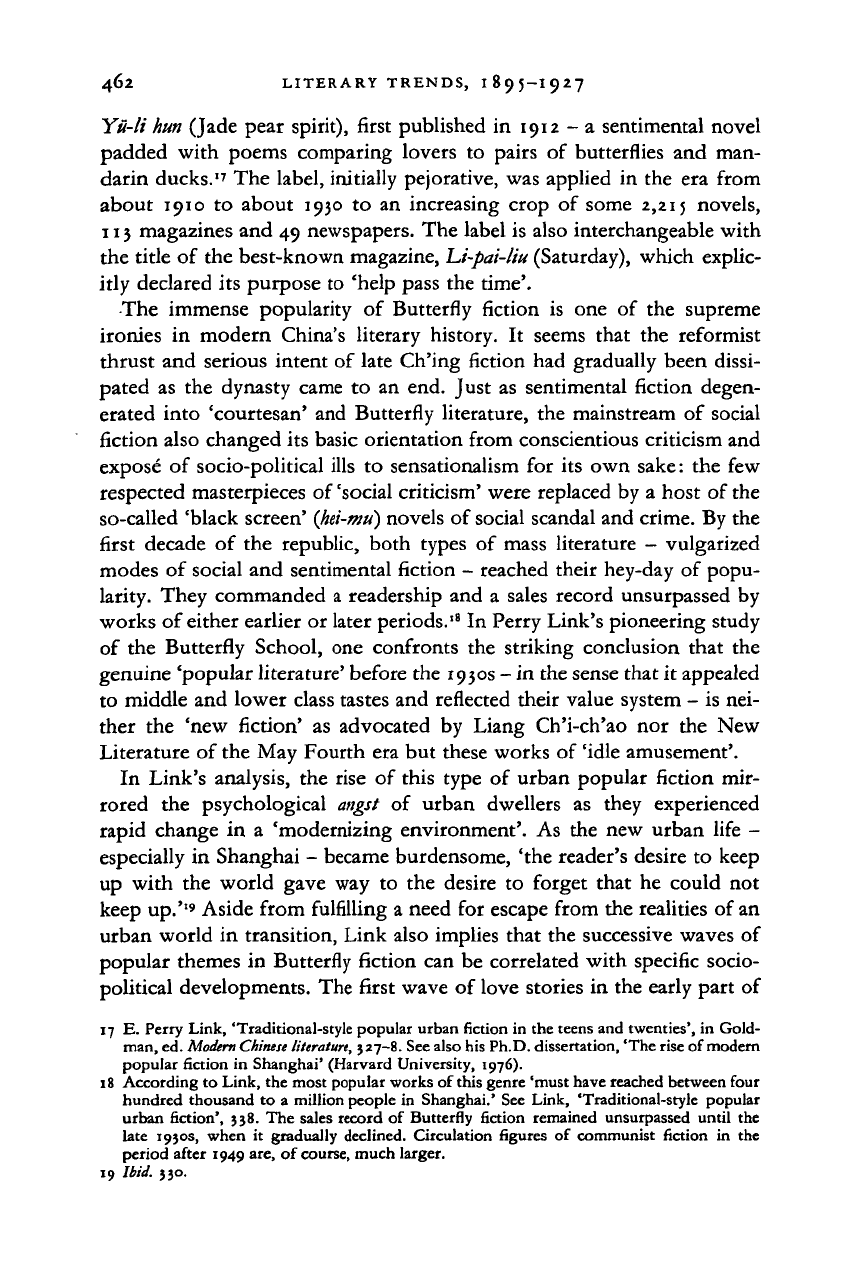
462 LITERARY TRENDS, 1895-I927
Yu-li
hun
(Jade pear spirit), first published in 1912
- a
sentimental novel
padded with poems comparing lovers
to
pairs
of
butterflies and man-
darin ducks.
17
The label, initially pejorative, was applied in the era from
about 1910
to
about 1930
to an
increasing crop
of
some 2,215 novels,
113 magazines and 49 newspapers. The label is also interchangeable with
the title
of
the best-known magazine,
L.i-pai-liu
(Saturday), which explic-
itly declared its purpose to 'help pass the time'.
The immense popularity
of
Butterfly fiction
is
one
of
the supreme
ironies
in
modern China's literary history.
It
seems that the reformist
thrust and serious intent
of
late Ch'ing fiction had gradually been dissi-
pated as the dynasty came
to
an end. Just as sentimental fiction degen-
erated into 'courtesan' and Butterfly literature, the mainstream
of
social
fiction also changed its basic orientation from conscientious criticism and
expose
of
socio-political ills
to
sensationalism for its own sake: the few
respected masterpieces of 'social criticism' were replaced by a host of the
so-called 'black screen'
(hei-mu)
novels of social scandal and crime. By the
first decade
of
the republic, both types
of
mass literature
-
vulgarized
modes of social and sentimental fiction
-
reached their hey-day of popu-
larity. They commanded a readership and
a
sales record unsurpassed by
works of either earlier or later periods.'
8
In Perry Link's pioneering study
of the Butterfly School, one confronts the striking conclusion that the
genuine 'popular literature' before the 1930s
-
in the sense that it appealed
to middle and lower class tastes and reflected their value system
-
is nei-
ther
the
'new fiction'
as
advocated
by
Liang Ch'i-ch'ao
nor
the New
Literature of the May Fourth era but these works of 'idle amusement'.
In Link's analysis, the rise
of
this type
of
urban popular fiction
mir-
rored
the
psychological angst
of
urban dwellers
as
they experienced
rapid change
in a
'modernizing environment'. As the new urban life
-
especially in Shanghai
-
became burdensome, 'the reader's desire to keep
up with the world gave way
to
the desire
to
forget that he could not
keep up.'
19
Aside from fulfilling a need for escape from the realities of an
urban world in transition, Link also implies that the successive waves of
popular themes in Butterfly fiction can be correlated with specific socio-
political developments. The first wave of love stories in the early part of
17 E. Perry Link, 'Traditional-style popular urban fiction in the teens and twenties', in Gold-
man,
ed.
Modern Chinese
literature,
$27-8. See also his Ph.D. dissertation, 'The rise of modern
popular fiction in Shanghai' (Harvard University, 1976).
18 According to Link, the most popular works of this genre 'must have reached between four
hundred thousand to
a
million people in Shanghai.' See Link, 'Traditional-style popular
urban fiction', 338. The sales record
of
Butterfly fiction remained unsurpassed until
the
late 1930s, when
it
gradually declined. Circulation figures
of
communist fiction
in the
period after 1949 are, of course, much larger.
19
Ibid.
330.
Cambridge Histories Online © Cambridge University Press, 2008
